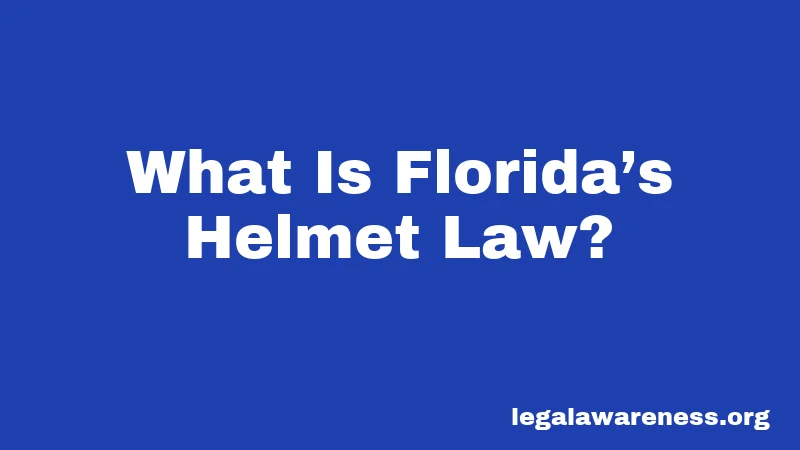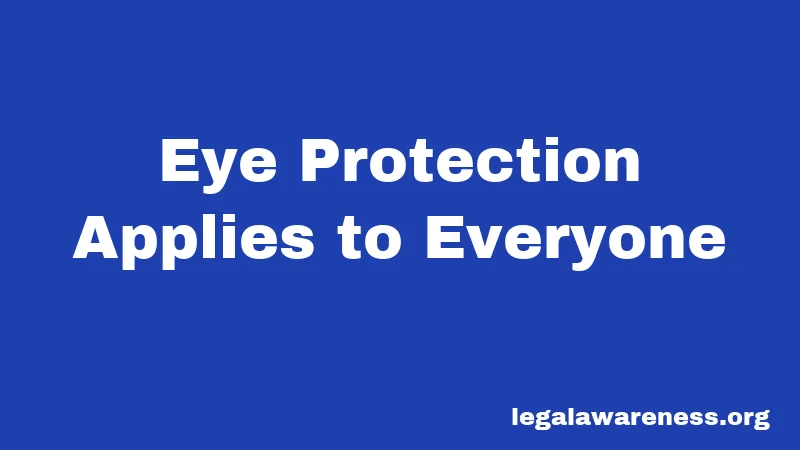Florida Helmet Laws in 2026: The Freedom and the Fine Print
You’re probably wondering if you can legally ditch the helmet and feel the wind in your hair while riding your motorcycle in Florida. Good news—depending on your age, you might be able to. Bad news—it’s way more complicated than most people think. Florida’s helmet laws have some seriously surprising loopholes. And if you get stopped, that fine might sting more than you’d expect.
Let me break down exactly what the law says and what it actually means for you.
What Is Florida’s Helmet Law?

Here’s the thing: Florida doesn’t require all motorcycle riders to wear helmets. Nope, that’s totally different from what most states do. Instead, the law has age-based rules and an insurance exemption that confuses a lot of riders. It basically says: “Younger riders must wear helmets. Older riders? We’ll let you decide—but there’s a catch.”
The main law is called Florida Statute Section 316.211. This statute has been around since July 1, 2000. Over two decades later, it’s still one of the most rider-friendly helmet laws in the country.
Who Has to Wear a Helmet in Florida?
Riders Under 21: Helmets Are Mandatory
Simple stuff here. If you’re under 21 years old, you must wear a helmet. Period. No exceptions. No “but I have good insurance” workaround. The law doesn’t care about your age, your experience level, or how short your ride is. Under 21 means helmet required.
Your helmet needs to meet federal safety standards. We’ll talk more about that in a bit.
Riders 21 and Over: The Insurance Option
Now here’s where things get interesting. Are you 21 or older? You might be able to skip the helmet. But—and this is important—you need to carry specific insurance coverage. You must have at least $10,000 in medical benefits coverage for injuries caused by motorcycle crashes. That’s the key trade-off.
Confused about the difference? Let me break it down. If you’re 21 and up, you can ride helmet-free only if your insurance policy specifically covers motorcycle injuries up to $10,000. That’s not your regular car insurance. It’s not your health insurance, though some health plans might qualify. You need proof that you have this coverage. Keep that proof with you when you ride.
Eye Protection Applies to Everyone

Okay, pause. Read this carefully. There’s one helmet rule that has zero exceptions.
Every single motorcycle rider in Florida—regardless of age—must wear eye protection. Goggles, a face shield, safety glasses. Something to protect your eyes. The only exception? If your motorcycle has a windshield, you’re good. Otherwise, that eye protection is non-negotiable.
Wind in your hair? Maybe. Wind in your eyes? The law says no way.
Special Situations and Exceptions
Small Bikes (Mopeds) and Young Riders
You operate a small motorcycle under 50 cubic centimeters? Or a bike that can’t go faster than 30 mph? If you’re 16 or older, you might not need a helmet. But here’s the catch: riders under 16 must still wear one, even on tiny bikes.
Think of it like a traffic ticket situation. For small bikes, teenagers need protection. Adults get a pass.
Riders in Enclosed Cabs
Got one of those cool enclosed motorcycle cabs? The helmet law doesn’t apply to you. The cab provides protection, so the law recognizes that you don’t need additional head gear. Make sense, right?
What Makes a Helmet Legal in Florida?

Not all helmets are created equal. Your helmet has to meet federal safety standards called Federal Motorcycle Vehicle Safety Standard 218. Basically, it means the helmet got tested and approved by the Department of Transportation.
Here’s what to look for: a DOT sticker on the back of the helmet. If you see that sticker, the helmet meets the requirements.
A good helmet should have these features. Impact-absorbing foam that cushions your head during a crash. A sturdy chin strap that stays fastened even in an accident. A proper fit that’s snug but not uncomfortable. And it should cover your forehead without blocking your vision.
Pro tip: Most manufacturers suggest replacing your helmet every 3–5 years. If it’s been damaged, don’t ride in it. That damage might have compromised the protection inside.
The Penalties: What Happens If You Break the Law
Not sure what counts as a violation? Let me explain. Riding without a helmet when you’re legally required to wear one gets you a traffic ticket. This isn’t criminal. You won’t go to jail. But you will get fined.
The fine starts at around $30 for your first offense. Get caught again within 12 months? That jumps to $60. It’s treated as what’s called a nonmoving violation. That means it doesn’t add points to your driving record. It’s basically a safety violation, not a driving skill violation.
Think of it this way: less severe than a speeding ticket, but still no joke if it happens twice.
Here’s Where It Gets More Serious
Stay with me here. The fine part is straightforward, but there’s another consequence that sneaks up on riders.
If you get into a motorcycle accident and you weren’t wearing a helmet—even if you were legally allowed to skip it—the insurance company might use that against you. Florida follows something called “comparative fault rules.” That’s a fancy way of saying: if the other person was at fault, but you made your injuries worse by not wearing a helmet, they might reduce your payment.
Let’s say you crash without a helmet and suffer a head injury. The other driver hit you. You’re not at fault for the crash. But the defense might argue that a helmet would have prevented or reduced your head injury. If a judge agrees, your compensation could get reduced.
This is honestly one of the most important things people miss. You can legally ride without a helmet. But if you get hurt, that choice might cost you money in the long run.
How to Prove You’re Legally Exempt From the Helmet Requirement
Wondering if you need to carry proof when you ride? Yes, absolutely.
If you’re 21 or older and riding without a helmet, you’re legally supposed to carry proof of your $10,000 medical benefits coverage. A health insurance card works. So does a policy declaration page. Law enforcement can ask to see it. You should have it ready.
What happens if you can’t show proof? You could face that $30 fine. The officer has to see documentation that your insurance covers motorcycle injuries up to $10,000. Keep it with you. Make it easy for yourself.
FAQ: Your Helmet Questions Answered
Can I wear any helmet I want, or does it have to be a specific brand? Any brand works as long as it has a DOT sticker. The brand doesn’t matter. What matters is that it meets federal safety standards.
What if I’m a passenger? Do I need a helmet? Yes. Passengers follow the same rules as riders. If the driver is under 21, passengers under 21 must wear helmets. If the driver is 21 and has proper insurance, passengers can skip helmets too.
If I’m 21 with proper insurance, should I still wear a helmet? That’s your choice legally. But safety experts say yes, definitely wear one. Helmets reduce your risk of fatal injuries by about 37%. That’s huge. The law lets you choose, but the science suggests helmets save lives.
Does my health insurance count toward the $10,000 requirement? Maybe. It depends on your policy. Some health insurance plans cover motorcycle-related injuries. Others don’t. Check with your provider to confirm your policy includes motorcycle accident coverage up to $10,000.
What if I get ticketed for not wearing a helmet but I claim I have insurance coverage? You still need proof. A verbal claim won’t work. You need to show documentation—an insurance card or policy declaration page. If you don’t have proof on you, you could get the fine.
Practical Guidance: What You Should Do Right Now
Step 1: Check Your Age
Are you under 21? Get a helmet today. Non-negotiable. Done.
Are you 21 or older? Move to step two.
Step 2: Review Your Insurance
Call your insurance company or log into your policy online. Find out if your health insurance or motorcycle insurance covers motorcycle-related injuries. Ask specifically: does it cover injuries from motorcycle accidents? Does it cover at least $10,000 in medical benefits?
Write down the answer. Keep records.
Step 3: Get a DOT-Approved Helmet (Even If Optional)
I get it. The law allows riders over 21 to skip helmets if they have insurance. But here’s my personal opinion: wear a helmet anyway. The protection is real. The risk is serious. Florida sees some of the highest motorcycle fatality rates in the country.
Step 4: Always Wear Eye Protection
This applies to absolutely everyone. No exceptions. Goggles or face shield. Always. This is a rule with zero workarounds.
Step 5: Keep Proof When You Ride
If you’re riding without a helmet (legally), carry proof of your medical benefits insurance. Insurance card. Policy page. Something documented. You don’t want to argue with a police officer about coverage you can’t prove.
What Riders Get Wrong About Florida’s Helmet Law
Most people assume this: “If I’m 21 and riding without a helmet, I’m completely legal.” Not quite. You’re legally allowed to ride without a helmet, but you must have that $10,000 medical insurance. Without proof, you can get fined.
Many riders also think: “The law is about safety, so it must cover all injuries.” Nope. The insurance requirement is specifically for injuries from motorcycle crashes. Your regular health insurance might not qualify unless it explicitly includes motorcycle accident coverage.
One more common mistake: “I have car insurance, so I’m covered.” Not necessarily. You need motorcycle-specific coverage or health insurance that covers motorcycle injuries.
Recent Changes and What to Watch For
The core helmet law hasn’t changed since 2000. Florida Statute 316.211 remains the same from 2025 into 2026. The age requirements are still the same. The insurance threshold is still $10,000.
However, enforcement has been increasing in some areas. Police departments have been paying more attention to helmet violations, especially during peak riding seasons and events like Bike Week. That special license plates for young riders make it easier for law enforcement to spot violations.
Final Thoughts
You now understand Florida’s helmet laws better than most riders. Here’s the quick version: if you’re under 21, wear a helmet. If you’re 21 or older, you can skip it—but only if you have $10,000 in motorcycle injury insurance and carry proof. Everyone needs eye protection.
The law gives adult riders freedom to choose. But choose wisely. Helmets save lives. Literally. And if you do get injured, that helmet choice could affect your legal claims.
Stay informed. Stay safe. When in doubt, wear the helmet. It’s not about what the law requires—it’s about getting home in one piece.
References
- Florida Statute §316.211 Motorcycle Helmet Requirements and Exemptions – Florida Legislature
- Florida Department of Highway Safety and Motor Vehicles – Helmet Exemption Information
- CDC Safety Data on Motorcycle Helmet Effectiveness – National Highway Traffic Safety Administration
- GreatFlorida Insurance – Florida Motorcycle Helmet Law 2025 Guide
- Florida Motorcycle Helmet and License Laws – DeLoach, Hofstra & Cavonis, P.A. (Updated September 2025)
- Comparative Fault Rules in Florida Motorcycle Accidents – Mickey Keenan, P.A.
